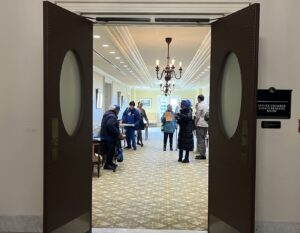
Members of the Mass. Senior Action Council mill around in the Senate lobby after meeting with Sen. Nick Collins for an hour and a half about the Boston property tax bill on Dec. 2, 2024. Photo by Sam Drysdale | State House News Service
A senator from South Boston delayed action Monday on a controversial, time-sensitive Boston property tax reclassification bill, which is now on ice until after the deadline for action recommended by Boston Mayor Michelle Wu.
After months of public and private talks, Sen. Nick Collins of South Boston used a procedural maneuver available to senators to punt the matter until the next session, which senators set for Thursday. Other Democrats also raised concerns about the bill on Monday.
Compromise language had been hammered out between the mayor’s office and business groups to temporarily reconfigure the way it splits its property taxes between commercial and residential taxpayers to prevent a major increase in bills for residents.
“Tax bills are issued to property owners on January 1, but there’s a lot of work that leads up to that. So in order for our team to use this mechanism and prepare bills for that deadline and for the [Department of Revenue] certification and City Council approval and all those steps, we would need this law signed by the governor within the next two weeks,” Wu said at a legislative hearing on Nov. 20.
Two weeks from that date is Wednesday, Dec. 4.
Homeowners, Multifamily Properties Face Big Increase
The mayor originally predicted residential property owners could see as much as a 33 percent increase in their taxes come January, as commercial owners have seen a reduction in taxable value as fewer employees have returned to offices and some employers have downsized their footprints in the wake of COVID-19. The mayor’s office recently shrunk that estimate to up to 28 percent — and other groups have smaller estimates on how much residents’ tax bills could actually increase in the new year without action on Beacon Hill.
“Our administration has been working diligently to provide all possible information and answer any questions on this matter for many months,” a Wu spokesperson said Monday. “Today is the first time we are hearing about the Senator’s specific concerns, and we will continue trying to reach him to understand the information he is seeking. In addition to reaching a compromise consensus with business groups, we have testified at multiple City Council and State House hearings, provided available data as it has been finalized, held town halls across the city, and reached out to each Senator multiple times to ask for their feedback and concerns. We will continue to prioritize all possible outreach on this short timeline before tax bills must be finalized to protect residents and stabilize bills for all taxpayers.”
Collins told reporters he had not had a one-on-one conversation with Wu about his concerns, but planned to talk to her later on Monday.
Many Towns Hope to Follow Boston’s Lead
Sen. Susan Moran, a Democrat from Falmouth who leads the Revenue Committee and has kept publicly quiet about her thoughts on the bill, spoke during Monday’s session to “provide context” on the bill, and validated the concerns of those opposed to the legislation.
“Boston’s commercial sector is essential not only to the city’s economic vitality, but also to the state’s,” Moran said. “There’s no doubt that how we pursue this issue will set a precedent for municipalities across the state… Today’s vote is important not just for Boston, but for the entire commonwealth. It affects our constituents who own businesses and property in Boston and many municipalities are watching this to see how the Legislature acts with respect to changing the balance of the residential, business tax balance.”
Moran quoted business groups who have expressed reservations about the move, including CEO of the National Association of Industrial and Office Properties of Massachusetts Tamara Small, Massachusetts Taxpayer Foundation President Doug Howgate and Boston Policy Institute Executive Director Greg Maynard.
“This is essentially being viewed as kicking them when they’re down. This is really just going to exacerbate the value loss property owners are seeing,” Moran said, referring to a comment Small made.
Sen. Michael Rodrigues, a Democrat from Westport who leads the Senate Ways and Means Committee, agreed with Moran that if the state allowed Boston to restructure its tax scheme, other municipalities would also want to do so.
He later added, “Boston is Boston, right? So the rest of the state always has their eyes on Boston. I’m sure that other communities are looking at what the Legislature does for Boston, and are going to ask questions of their senators: why can’t you do it for us also? So yeah, that’s always the case. Boston is Boston.”
Collins Cites Need for City Tax Hearing
Collins said he was delaying the vote until the Boston City Council could hold its annual tax classification hearing on Tuesday. The hearing will also cover diversifying the city’s budget — as an increasingly heavy reliance on property taxes over the past two decades has led to this situation where decreasing commercial values is threatening to destabilize the city’s tax base.
“Most of this issue has been debated with hypothetical figures as uncertified numbers have been varied,” Collins said during the session. “Tomorrow, the Boston City Council will have their annual tax classification hearing. It’s my hope that information will be made available to the council and the public so we can get a full picture, and if members of the Senate and the constituents we serve get that as well, we all deserve that.”
The city last week submitted to the Department of Revenue its property valuations, which will be used to calculate January tax bills, so Collins said he’s hopeful he’ll get a better understanding during Tuesday’s hearing as to what the “real [budget] gap” is.
“I’m opposed to the idea of doing something without the facts. And I think tomorrow, hopefully we’ll get that, at least from somebody at DOR or the city, and understand what our budget gap is and how that can be mitigated and is this the only tool? And I think if we don’t have that information it’s hard to make that decision accurately,” the South Boston Democrat later told reporters.
Seniors Seen as Vulnerable to Tax Hike
The Massachusetts Senior Action Council has been pushing for the Legislature to approve the bill, and last week advocates from that group tried to track down Collins in the State House hallways to talk him about the bill.
Collins met with the group for about 90 minutes in the Senate Reading Room after Monday’s session. Asked how he defended his position to them, Collins replied that the advocates were not aware of other options the city could take to prevent their taxes from going up.
“They were unaware of the surplus in the city’s rainy day account. They’re also, I think, absorbing how we had to address our [state] budget gap this year and what actions the governor had to take earlier this year,” Collins said, referring to budget cuts and hiring freezes the governor put in place.
Collins also pointed to a supplemental budget before the City Council that would draw $110 million from their rainy day fund to go towards a new housing program.
“This is an allotment the city thinks they need to make. And so, as they’re considering drawing from the rainy day fund in a supplemental budget to support a program, should they be doing that? Should they be considering that to mitigate a budget gap which the size of which we won’t know probably until tomorrow?” Collins said.
A reporter asked the senator if it was late to be raising these concerns. The bill has had two public hearings, undergone both public and private negotiations for months, and is up against a ticking clock to get tax bills out to residents before the end of the year.
“Concerns have been raised the whole time,” Collins said. “We’re hoping to hear tomorrow more about what the status of the city’s finances are, so, to be continued.”
If the tax reconfiguration bill becomes law, the city council will still need to vote again to implement the new rate.






